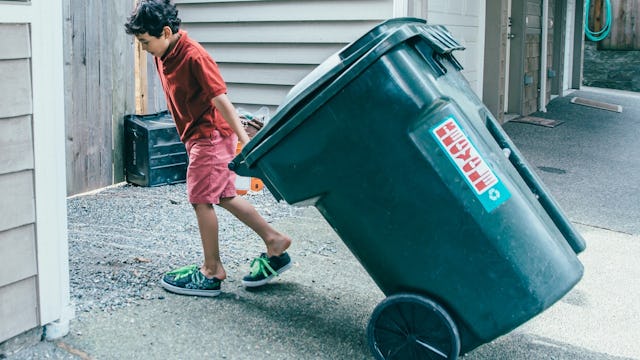Want Your Kids To Appreciate You? Make Them Do Sh*t For Themselves

The other morning, my son woke up late for school, stayed in the bathroom fixing his hair for a bit too long, then asked me to make his lunch.
No can do, buddy. Do you know why? This mama tried to get him to do it last night, and it went something like this: “Pack your lunch for tomorrow, please.”
“I’ll do it in the morning,” he said.
“We’ve tried that, and you end up sprinting around. It’s too stressful, so you need to pack your lunch the night before.”
But he didn’t. And I didn’t remind him again.
I believe hunger works better than nagging. Natural consequences. So when he whined at me to pack it for him the next morning, I refused.
Sure, it was hard to say no, but if my kids can’t follow the rules, it’s not my job to adjust them. If I don’t enforce the rules, then “rules” start to look more like “suggestions.” And that spells disaster all-around. I’m not doing them, or the world, any favors by consistently bailing them out. It’s easier to learn these lessons now when the consequences are smaller and more bearable.
It’s not easy sending your kids to school knowing they only had time to grab an apple and granola bar when I suppose I could have made a full lunch for him, but you know what? That was the first and only time he’s forgotten to pack his lunch. He fills his lunchbox up each night after dinner. Because rules work, and this was a lesson we both learned the hard way.
Because there was a time when I would have packed a lunch for him. There was a time I did too much for my kids. There was a time when I was kind of a doormat, which gives me a bit of that 20/20 hindsight that lets me stand on my soapbox now and tell you life is so much better when you don’t live with entitled brats that you created because you did everything for them.
Do they get mad at me? Yes.
Do I feel guilty sometimes? Yes.
Do they appreciate me more now that they know I’m not there to make life super-cushy for them? Hell yes.
Of course, I still think I should get more appreciation (welcome to motherhood), but the fact that they don’t depend on me to just take care of shit — they do more themselves now — makes us all so much happier.
My kids aren’t perfect by any means, but neither am I. We all have our slip-ups, but they know that if they don’t follow the rules, clean up after themselves, and treat me with respect, I won’t do certain things either. Like buy them those shoes that “everyone else has.”
We are a team, so we need to work together. I will help them if they help themselves. And if they see me struggling and lend a hand, it never goes unnoticed. But if I am going to bend over backwards for them, then I expect them to appreciate me and show gratitude.
We value things we work for. We appreciate the people who encourage us to reach for the stars (or the damn bread so we can make our own sandwich). There is honor in fending for yourself. It boosts kids’ self-confidence when they are able to tackle things and realize how capable they are. Sure, sometimes that feeling is masked by eye-rolls, but they still feel it.
It’s hard to watch your kids grow up and shift your parenting methods from doing it all for them to teaching them how to do it themselves. I wasn’t always very good at this — because, hello, it’s so much easier to clean the bathroom myself than listen to them bitch and moan and half-ass their way through it — but when you spend weeks or months feeling utterly unappreciated, you just might have to have a come-to-Jesus moment with your child in the middle of the living room.
You accept part of the responsibility and change your ways. You put your foot down. You say “No can do, but you can do it yourself.”
And just like that, you have more time to scroll Facebook and make plans to have coffee with friends because you’ve lightened your physical and mental load and your kids are learning the art of had work and appreciation. And it feels really damn good.
This article was originally published on